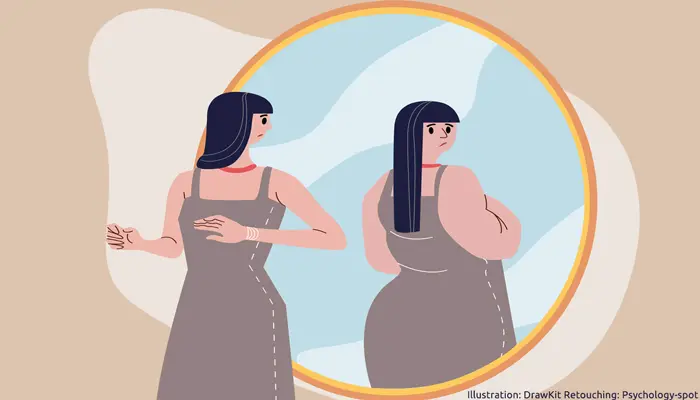
The numbers of those affected by anorexia far from diminishing every day, are increasing.
There are three essential characteristics to diagnose nervous anorexia according to DSM-IV diagnostic manual of mental disorders:
1. The person refuses to maintain minimum normal body weight for height and age
2. Intense fear of gaining weight
3. Altered perception of the size or shape of the body
Another sure sign is the appearance of amenorrhea due to abnormally low levels of estrogen.
When it is considered that weight is below normal levels? When less than 85% of the established norm.
How it is reduced body weight? With a very restricted diet that initially removes all high-calorie foods, then ending up to almost stop eating all kinds of food. However, some people make themselves throw up after eating, make inappropriate use of laxatives and diuretics, or perform an excess of physical exercise. In connection with these habits and behaviors we can mention two subtypes of nervous anorexia:
1. Restrictive: weight loss is achieved by dieting, fasting or doing strenuous exercise. During episodes of nervous anorexia, these individuals don’t use to go bingeing or purging.
2. Compulsive-purging: the person does binge eating and/or purging regularly. After binge episodes comes the purging, induced vomiting or the use of diuretics, laxatives or enemas in an excessive form. There are some cases which don’t recur to binge but often to purges, even after eating small amounts of food.
Does it disappear the fear of gaining weight once reached the “ideal weight”? No, paradoxically, the fear of gaining weight increases although the weight decreases, because there’s a change in body shape perception. Usually, they still find parts of their body improperly obese and use a variety of techniques to weigh and measure the different parts of the body. The mirror is the permanent companion.
What does it mean losing weight to these people? Normally, people suffering anorexia believe that losing weight is synonymous of extraordinary self-discipline, consequently they consider weight gain as a loss of self-control.
What are the psychological consequences of this disorder? Usually, after suffering a considerable weight loss appears depression, including major depression, irritability, insomnia, social withdrawal and a loss of interest for sex. It is also usual the occurrence of the obsessive-compulsive disorder, the concern about eating in public, the feelings of inadequacy, the need to control the environment, rigid thinking and a decreased capacity for expressing emotions and initiative.
Although, people who suffer the binge-purging type are more likely to have problems controlling their impulses, so they can abuse alcohol and other drugs showing a strong emotional lability.
How this disorder begin? Usually the beginning is associated with a stressful event acting as a trigger for the person.
What is the prognosis? The course of anorexia varies pretty much, some people fully recover after a single episode, while others relapse and suffer from a chronic deterioration through the years. The mortality is approximately 10% and is usually caused by starvation, suicide or electrolyte imbalance.



